The following blog post was written by my friend and frequent travel partner Kristen Moran about her own perspectives on sailing through the Greek islands with Sail Future.
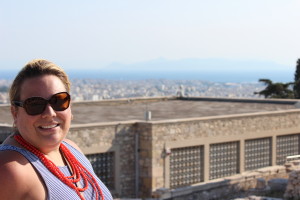 In March 2015, while wearing a Shamrock sling to support my still slightly broken shoulder, I received an email from a close friend, Francisco, inviting me to go on a summer sailing trip in Europe to support a charity for at-risk youth, Sail Future. Having just missed the annual Rock Boat cruise (the “flat-Kristen” pictures were nice, but definitely not the same), and needing some time away from the office, this seemed like the perfect adventure—and for a good cause, how could I refuse. Within the next week, Cisco had rallied a couple more (my new friends, Tyler and James), and the four of us were booked to sail Greece in July. During the next 100 days, I experienced periods of excitement and outright fear—my arm break was severe, and my physical activity was almost non-existent as a result. Physical therapy and time would heal all, and on June 29, I was, thankfully, cleared for travel, and my upcoming trip.
In March 2015, while wearing a Shamrock sling to support my still slightly broken shoulder, I received an email from a close friend, Francisco, inviting me to go on a summer sailing trip in Europe to support a charity for at-risk youth, Sail Future. Having just missed the annual Rock Boat cruise (the “flat-Kristen” pictures were nice, but definitely not the same), and needing some time away from the office, this seemed like the perfect adventure—and for a good cause, how could I refuse. Within the next week, Cisco had rallied a couple more (my new friends, Tyler and James), and the four of us were booked to sail Greece in July. During the next 100 days, I experienced periods of excitement and outright fear—my arm break was severe, and my physical activity was almost non-existent as a result. Physical therapy and time would heal all, and on June 29, I was, thankfully, cleared for travel, and my upcoming trip.
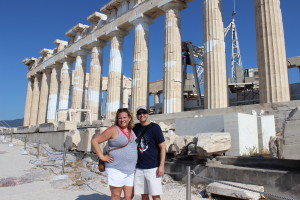 I packed, re-packed, and pack again, my duffle bag (which was still bursting at the seams and overweight for a carry-on), and on July 2, met Cisco and Tyler for our flights to Athens. We arrived on July 3, with approximately 24 hours to explore the city, before meeting our boat/home for the week. We checked into a hostel (my first at 36 years old), and set out for the Acropolis. I was impressed by the magnitude of the site, and the feeling that we were part of history just being there. A feast of a dinner for 12 euros each, and a trip to the Temple of Zeus and the Olympic Stadium the following morning completed our tourist-time in Athens. The time had come to meet the rest of our travel partners at the Astir Marina; and following a transition lunch with the Week 3 sailors, a carafe of Ouzo, and some quick introductions, 16 of us (we’d pick up one more along the way) were ready to set sail on a 65-ft sleek racing sailboat.
I packed, re-packed, and pack again, my duffle bag (which was still bursting at the seams and overweight for a carry-on), and on July 2, met Cisco and Tyler for our flights to Athens. We arrived on July 3, with approximately 24 hours to explore the city, before meeting our boat/home for the week. We checked into a hostel (my first at 36 years old), and set out for the Acropolis. I was impressed by the magnitude of the site, and the feeling that we were part of history just being there. A feast of a dinner for 12 euros each, and a trip to the Temple of Zeus and the Olympic Stadium the following morning completed our tourist-time in Athens. The time had come to meet the rest of our travel partners at the Astir Marina; and following a transition lunch with the Week 3 sailors, a carafe of Ouzo, and some quick introductions, 16 of us (we’d pick up one more along the way) were ready to set sail on a 65-ft sleek racing sailboat.
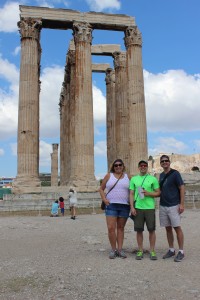 From July 4-11, we’d sail throughout the Greek islands; spending our first night outside Athens, at an uber-posh cliff-side club, before setting sail for Aegina. In Aegina, we watched with the locals as the results of the Greek economic vote trickled in, and most of the crew, went on a scenic scooter ride around the island (which I sheepishly and stupidly skipped). We, next, spent the evening sailing on the boat; a true highlight of the trip as we shared dinner (I actually cooked), great conversations, and quiet star-gazing before anchoring off the uninhabited island of Dhokos. Following a morning of swimming, we made our way to Hydra; a gorgeous island, with no motorized transportation, for drinks, dancing (our group has some moves), and cliff-diving (ok, jumping). From there, we traveled to Poros, and in addition to more dancing and drinks, the evening was highlighted by a roof-top dinner overlooking the city with my travel foursome. Waking up with the feeling that “vacation is almost over” was difficult, but was curtailed by a quiet day/night on a beach with a bonfire in Methana. With one night left on the sailboat, we made our way back to a remote (i.e. shady) area of Athens; we showered, dined, and shared stories of our experiences. A transition lunch from our Week 4 group (Team N. American Stimulus) to the Week 5 group was held, and soon, our crew of 17 had shrunk to 3. Following a night in a great hotel, and another rooftop feast, Tyler, Cisco, and I made our way back to the Athens airport—and home to the States on July 12.
From July 4-11, we’d sail throughout the Greek islands; spending our first night outside Athens, at an uber-posh cliff-side club, before setting sail for Aegina. In Aegina, we watched with the locals as the results of the Greek economic vote trickled in, and most of the crew, went on a scenic scooter ride around the island (which I sheepishly and stupidly skipped). We, next, spent the evening sailing on the boat; a true highlight of the trip as we shared dinner (I actually cooked), great conversations, and quiet star-gazing before anchoring off the uninhabited island of Dhokos. Following a morning of swimming, we made our way to Hydra; a gorgeous island, with no motorized transportation, for drinks, dancing (our group has some moves), and cliff-diving (ok, jumping). From there, we traveled to Poros, and in addition to more dancing and drinks, the evening was highlighted by a roof-top dinner overlooking the city with my travel foursome. Waking up with the feeling that “vacation is almost over” was difficult, but was curtailed by a quiet day/night on a beach with a bonfire in Methana. With one night left on the sailboat, we made our way back to a remote (i.e. shady) area of Athens; we showered, dined, and shared stories of our experiences. A transition lunch from our Week 4 group (Team N. American Stimulus) to the Week 5 group was held, and soon, our crew of 17 had shrunk to 3. Following a night in a great hotel, and another rooftop feast, Tyler, Cisco, and I made our way back to the Athens airport—and home to the States on July 12.
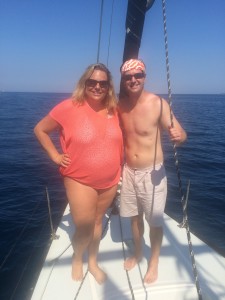 During my time in Greece, I experienced some high-highs and some low-lows. I jumped off cliffs and the sailboat into turquoise waters. I felt the sun on my face and the wind in my hair, as we sailed between the islands. And, I felt the excitement of meeting new people and seeing new things. But, I also felt my age, and I felt my 6-months of limited activity, as I watched the other travelers climb effortlessly up the cliffs or across the sailboat like parkour enthusiasts. And, at times, I felt jaded at my professional plateau, as I listened to the educational and career successes of my peers. I could’ve let the fears and doubts win, but I chose to let them invigorate me—to work-out more, to read for enjoyment, to take professional risks, and to follow my dreams.
During my time in Greece, I experienced some high-highs and some low-lows. I jumped off cliffs and the sailboat into turquoise waters. I felt the sun on my face and the wind in my hair, as we sailed between the islands. And, I felt the excitement of meeting new people and seeing new things. But, I also felt my age, and I felt my 6-months of limited activity, as I watched the other travelers climb effortlessly up the cliffs or across the sailboat like parkour enthusiasts. And, at times, I felt jaded at my professional plateau, as I listened to the educational and career successes of my peers. I could’ve let the fears and doubts win, but I chose to let them invigorate me—to work-out more, to read for enjoyment, to take professional risks, and to follow my dreams.
THANK YOU to everyone that made this a trip-of-a-lifetime. You are each special and unique, and have so much to offer your family, friends, and the world! I am privileged to call you friends, and look forward to many reunions in DC and around the globe. Special thanks to Mike Long for starting Sail Future, and sharing it with all of us; your blend of charisma, intelligence, and desire to help others is truly one-of-a-kind. I look forward to meeting the youth in Baltimore, to following your Trans-Atlantic voyage, and to supporting Sail Future in its endeavors. And, finally, a very special thanks to Francisco (you’ll always be Cisco to me) for inviting me along; your friendship means the world to me, and I look forward to another 14+ years of memories and experiences.
Until we all meet again (and for those who weren’t lucky enough to travel), let me leave you with some Key Travel Tips for Greece:
10. Be prepared for Feast or Famine.
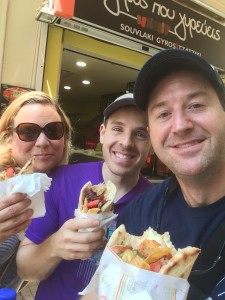 Meal-time in Greece, especially when you are traveling on a sailboat with 17 people, can be “Feast or Famine.” At the height of the Greek economic collapse, restaurants, especially on the mainland, are rather empty, and for approximately $15-20, you can eat like a king (or queen) with Greek salads (no lettuce!), main courses of sausages and moussakas, and house wine. However, when you are on a sailboat, with a limited kitchen space and cookware, making a meal that satiates a group (with a lot of 20-something males) can be extremely difficult, and no matter how tasty, the portion size may leave something to be desired. Therefore, it is critical in Greece to supplement each meal with peanut butter sandwiches. These sandwiches can be made on bread or pita, and can be garnished with jelly, Nutella, bananas, honey, and chocolate (as available).
Meal-time in Greece, especially when you are traveling on a sailboat with 17 people, can be “Feast or Famine.” At the height of the Greek economic collapse, restaurants, especially on the mainland, are rather empty, and for approximately $15-20, you can eat like a king (or queen) with Greek salads (no lettuce!), main courses of sausages and moussakas, and house wine. However, when you are on a sailboat, with a limited kitchen space and cookware, making a meal that satiates a group (with a lot of 20-something males) can be extremely difficult, and no matter how tasty, the portion size may leave something to be desired. Therefore, it is critical in Greece to supplement each meal with peanut butter sandwiches. These sandwiches can be made on bread or pita, and can be garnished with jelly, Nutella, bananas, honey, and chocolate (as available).
9. Drink your water.
While the Greek hospitals are free and the staff welcoming (so I hear), dehydration is never fun, and visiting local hospitals pales in comparison to visiting the local monuments, cafes, and boutiques. Therefore, it is necessary to drink lots of water; preferably from 1.5 liter bottles that are shared with 3 to 4 of your closest travel friends. Any fear of germs and cross-contamination are overcome by the desire to “not die” (and the desire to drink more alcohol). It is especially critical to note that the salt-water (which is ever so prevalent when sailing) will not, in fact, quench your thirst, and will actually make your thirstier.
8. Poseidon always wins.
As the “God of the Sea,” Poseidon will win in any battle. If you accidentally drop your food, your sunglasses, or even your West Point class ring in the sea, Poseidon will graciously accept the contributions to his underwater kingdom, and ensure that you do not get them back to be squandered on land. Likewise, Poseidon will ensure that if you want to sail a particular route (using the sails and not a motor) that your wind will be lacking and the current non-existent; ensuring that you will minimize the distance of your trip.
7. Remember, it’s the climb.
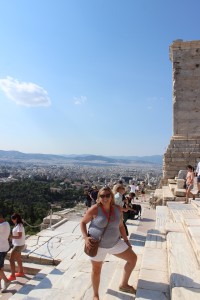 Greece and its islands are a series of hills and cliffs, and the Americans with Disabilities Act (ADA) definitely doesn’t apply. Therefore, in the words of Miley Cyrus, “it’s the climb.” Whether you are at the Acropolis or just going to dinner, the best sights are at the top of the hill; so put on your real shoes (or suffer in your flip flops), look for the Greek flag, and start climbing. Mopeds (as in Aegina) and donkeys (as in Hydra) may be used when the duration and length of the climb is too much for human legs to handle. Likewise, it is best to climb before jumping into the water—from a cliff or the mast of the sailboat.
Greece and its islands are a series of hills and cliffs, and the Americans with Disabilities Act (ADA) definitely doesn’t apply. Therefore, in the words of Miley Cyrus, “it’s the climb.” Whether you are at the Acropolis or just going to dinner, the best sights are at the top of the hill; so put on your real shoes (or suffer in your flip flops), look for the Greek flag, and start climbing. Mopeds (as in Aegina) and donkeys (as in Hydra) may be used when the duration and length of the climb is too much for human legs to handle. Likewise, it is best to climb before jumping into the water—from a cliff or the mast of the sailboat.
6. What’s the WiFi?
When we traveled to Greece in July 2015, the country was on the brink of financial collapse; Greek residents were limited in the amount of money they could withdraw daily from their bank accounts, and tourists were largely absent from the major sites and the restaurants. That said, our team of 17 was ready and willing to support the local economy, as long as a WiFi code was available (Note: a bunch of students and young professionals can only survive so long (approximately 18 hours, I calculated) without a connection to the outside world). Once free WiFi was established, and the password entered (either the phone number or the name of the establishment with ‘2015’), our team could order an obligatory beverage or gelato, and tune into the “real world” for 2+ hours with little acknowledgement of the breath-taking scenery outside.
5. Just dance.
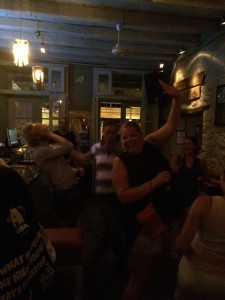 Music on the boat is lively (thanks largely to international DJ Simon sampling beats from DJ Snake), and dancing comes naturally. On the boat, it is critical to work the “pole” (i.e. holding onto random metal cables so as to not fall off) and practice your “raise the roof” and fist-pumping, but full-out dancing on a sailboat is difficult. Therefore, after ample pre-gaming until the alcohol supply is depleted, it is paramount that you leave the boat and find a nearby café (turned disco) for late night shenanigans. Group choreography; old-school bumping and grinding; salsa dancing; and a unique Canadian jive are required dance forms for the evening. Should the group appear tired, it is customary for the drunkest person to jump on a bar, table, or couch to turn-up the party; a dropped glass, round of Ouzo shots, or crazy Californians may also work.
Music on the boat is lively (thanks largely to international DJ Simon sampling beats from DJ Snake), and dancing comes naturally. On the boat, it is critical to work the “pole” (i.e. holding onto random metal cables so as to not fall off) and practice your “raise the roof” and fist-pumping, but full-out dancing on a sailboat is difficult. Therefore, after ample pre-gaming until the alcohol supply is depleted, it is paramount that you leave the boat and find a nearby café (turned disco) for late night shenanigans. Group choreography; old-school bumping and grinding; salsa dancing; and a unique Canadian jive are required dance forms for the evening. Should the group appear tired, it is customary for the drunkest person to jump on a bar, table, or couch to turn-up the party; a dropped glass, round of Ouzo shots, or crazy Californians may also work.
4. Millennials will save the world.
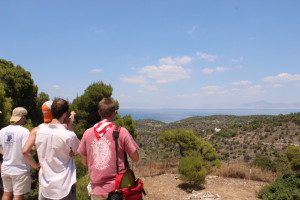 We’ve all read the stories of entitled millennials that don’t work for their achievements; expecting that they’ll be given whatever they want. As one of the two non-millennials on this boat, I can honestly say, that this group turned that notion on its head. When there was downtime, this group collectively joined in on conversations from leadership fundamentals to international politics; never judging, but rather openly sharing thoughts and opinions. Classical literature was read, shared, and discussed. And, resumes were updated and distributed overseas; grant proposals were carefully executed; and articles were researched and written on the Greek economy. “Our Kids” were truly lovers of education and (Greek) enlightenment.
We’ve all read the stories of entitled millennials that don’t work for their achievements; expecting that they’ll be given whatever they want. As one of the two non-millennials on this boat, I can honestly say, that this group turned that notion on its head. When there was downtime, this group collectively joined in on conversations from leadership fundamentals to international politics; never judging, but rather openly sharing thoughts and opinions. Classical literature was read, shared, and discussed. And, resumes were updated and distributed overseas; grant proposals were carefully executed; and articles were researched and written on the Greek economy. “Our Kids” were truly lovers of education and (Greek) enlightenment.
3. Use nicknames as appropriate.
When in Greece with a group of crazy American (see 2.), it is imperative that aliases are employed to protect the innocent—and guilty. Therefore, once the group has formed, stormed, and (almost) normed, it is time to assign nicknames with special significance. There was Scooter (who fought the Greek law when he laid down the moped); Havana (whose parents came from Cuba); Pipes (who loved to sing); and my own special Re-fun(d) designation (self-explanatory). But as with any nickname, some will be so astutely assigned that the person will become the name. Take for example, our beloved “Ghost;” an international man of mystery, who would disappear each time we were in port; appearing briefly to display his dancing prowess and to steer us out of major swells on the sea.
2. Americans are “not normal.”
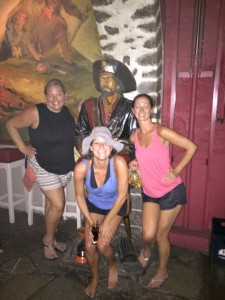 Joining the boat on Fourth of July, in a foreign country nearing financial collapse, can easily shine light on the fact that Americans (and Canadians) are “not normal” (as said in your best Greek/random European accent). We wear flag bandanas, bikinis (still can’t believe I did that), and T-shirts, and we sing the Star-Spangled Banner together on the deck of our sailboat. We play Truth and Dare; we do naked push-ups on a bar; we try to board luxury yachts; we shower using a hose on a public sidewalk; we get in fights in Greek bars; we ride mechanical teacups; we bring home a stray dog; and we get turned away from marinas (with what appear to be open-slips). But, all-in-all, we have fun, and the Belgians like us… so, who’s ready for Tomorrowland 2016?
Joining the boat on Fourth of July, in a foreign country nearing financial collapse, can easily shine light on the fact that Americans (and Canadians) are “not normal” (as said in your best Greek/random European accent). We wear flag bandanas, bikinis (still can’t believe I did that), and T-shirts, and we sing the Star-Spangled Banner together on the deck of our sailboat. We play Truth and Dare; we do naked push-ups on a bar; we try to board luxury yachts; we shower using a hose on a public sidewalk; we get in fights in Greek bars; we ride mechanical teacups; we bring home a stray dog; and we get turned away from marinas (with what appear to be open-slips). But, all-in-all, we have fun, and the Belgians like us… so, who’s ready for Tomorrowland 2016?
1. Stop and “Pause for the Cause.”
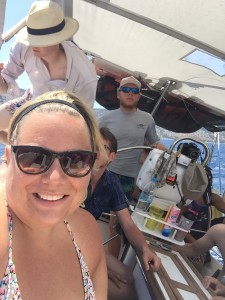 After all of the drinking, dancing, exploring, talking, swimming, and star-gazing, the ultimate travel tip is to “Pause for the Cause.” Mike Long has created an amazing thing with Sail Future. In a short time, he has had a boat donated, has lined up sponsors and adventurers, and has prepared to take a team of at-risk youth across the Atlantic. It’s easy to think we’re “just on a vacation,” but in fact, we are all critical players in the organization’s success. We can use our experiences, our words, and our actions to spread the word about Sail Future in the coming months to our family and friends. If you are reading this, I hope you’ll visit the website, www.sailfuture.org, and join me in donating to this worthy and inspirational cause.
After all of the drinking, dancing, exploring, talking, swimming, and star-gazing, the ultimate travel tip is to “Pause for the Cause.” Mike Long has created an amazing thing with Sail Future. In a short time, he has had a boat donated, has lined up sponsors and adventurers, and has prepared to take a team of at-risk youth across the Atlantic. It’s easy to think we’re “just on a vacation,” but in fact, we are all critical players in the organization’s success. We can use our experiences, our words, and our actions to spread the word about Sail Future in the coming months to our family and friends. If you are reading this, I hope you’ll visit the website, www.sailfuture.org, and join me in donating to this worthy and inspirational cause.
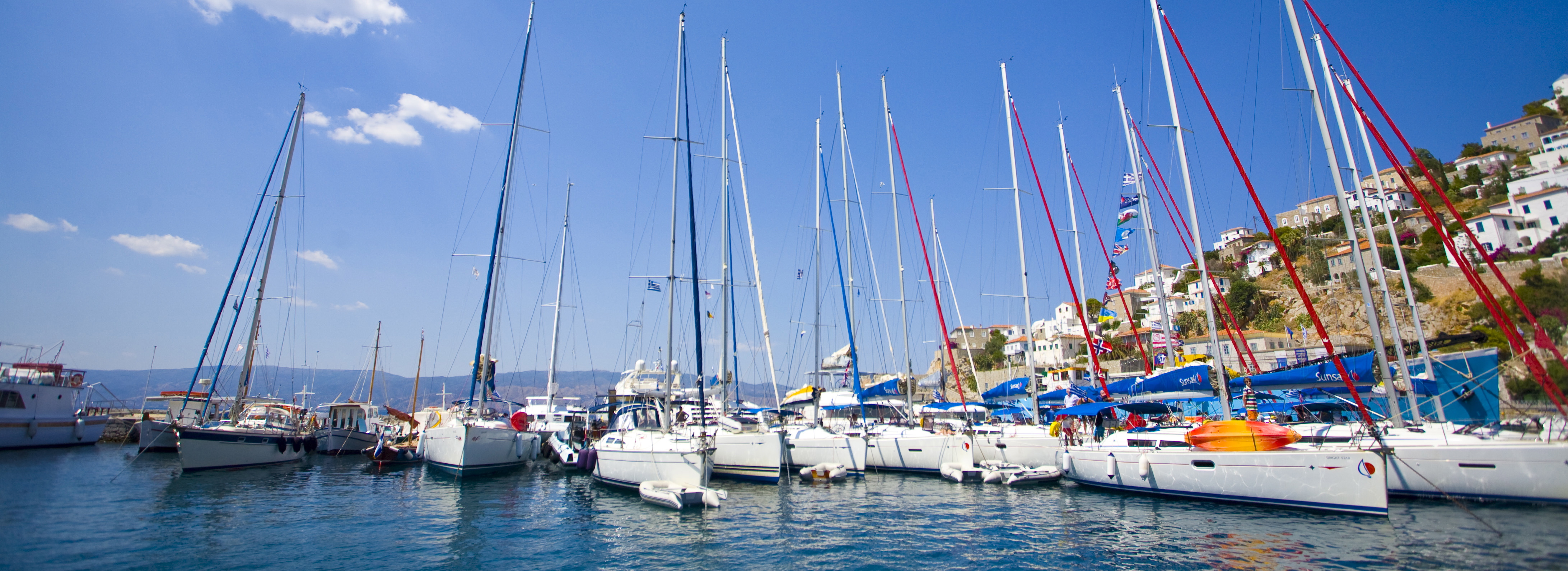
[…] Kristen Moran: “Greece 2015 with Sail Future” […]
Love the tips Kristen! Glad you such a great trip! And he’ll always be Cisco to me too